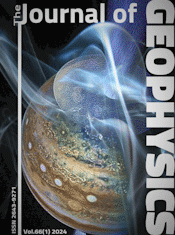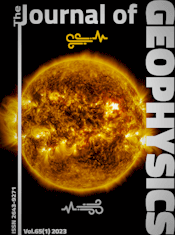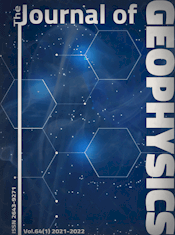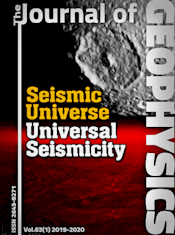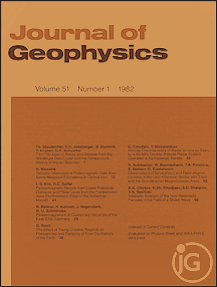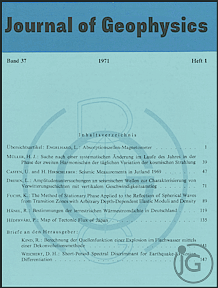Construction of conductance bounds from magnetotelluric impedances
Article Sidebar
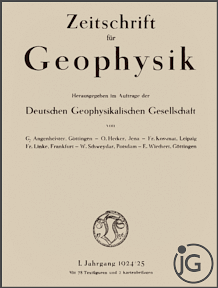
Vols. 1-18 (1924-1944), ISSN 0044-2801
Main Article Content
Abstract
Whereas any finite set of impedance data does not constrain the electrical conductivity σ (z) at a fixed level z in a 1D-model, the conductance function S (z2) as the depth-integrated conductivity from the surface to the depth z2 will be constrained. Assuming only the non-negativity of σ (z), it is shown that for a given depth z2 the models generating the lower and upper bound of S (z2) consist of a sequence of thin sheets. The determination of the positions of the thin sheets and their conductances leads to a system of nonlinear equations. As a limitation the present approach requires the existence of a model, which exactly fits the data. The structure of the extremal models as a function of z2 is discussed in examples with a small number of frequencies. Moreover, it is shown that any set of complex 1D impedances for M frequencies can be represented by a partial fraction expansion involving not more than 2M (positive) constants. For exactly 2M constants there are two complementary representations related to the lower and upper bound of S (z2). For the simple one-frequency case, a more general extremal problem is briefly considered, where the admitted conductivities are constrained by a priori bounds σ – (z) and σ + (z) such that σ – (z) ≤ σ (z) ≤ σ + (z). In this case, the extremal models for S (z2) consist of a sequence of sections with alternating conductivities σ – (z) and σ + (z). The sharpening of conductance bounds by incorporating a priori information is illustrated by an example.
 ARK: https://n2t.net/ark:/88439/y078099
ARK: https://n2t.net/ark:/88439/y078099
Permalink: https://geophysicsjournal.com/article/237
Article Details
References
Anderssen, R.S., Seneta, E. (1972) A simple statistical estimation procedure for Monte Carlo inversion in geophysics. II: Efficiency and Hempel's paradox. Pure Appl. Geophys. 96:5-14
Barcilon, V. (1979) Ideal solution of an inverse normal mode problem with finite spectral data. Geophys. J. R. Astron. Soc. 56:399-408
Barcilon, V., Turchetti, G. (1979) On an inverse eigenvalue problem with truncated spectral data. In: Anger, G. (Ed.) Inverse and improperly posed problems in differential equations, pp. 25-34, Akademie-Verlag, Berlin
Brown, K.M. (1973) Computer oriented algorithms for solving systems of simultaneous nonlinear algebraic equations. Byrne, G.D., Hall, C.A. (Eds.) pp. 281-348. Academic Press, NewYork and London
Jones, A.G. (1980) Report on the COPROD study. Paper read at the Fifth Workshop on Electromagnetic Induction in the Earth and Moon, Istanbul, August 18-23
Lawson, C.L., Hanson, R.J. (1974) Solving least squares problems. Prentice-Hall, Englewood Cliffs
Oldenburg, D.W. (1983) Funnel functions in linear and non-linear appraisal. J. Geophys. Res. 88:7387-7398
Parker, R.L. (1972) Inverse theory with grossly inadequate data. Geophys. J. R. Astron. Soc. 29:123-138
Parker, R.L. (1974) Best bounds on density and depth from gravity data, Geophysics 39:644-649
Parker, R.L. (1975) The theory of ideal bodies for gravity interpretations. Geophys. J. R. Astron. Soc. 42:315-334
Parker, R.L. (1977) The Frechet derivative for the one-dimensional electromagnetic induction problem. Geophys. J. R. Astron. Soc. 49:543-547
Parker, R.L. (1980) The inverse problem of electromagnetic induction: existence and construction of solutions based on incomplete data. J. Geophys. Res. 85:4421-4428
Parker, R.L. (1982) The existence of a region inaccessible to magnetotelluric sounding. Geophys. J. R. Astron. Soc. 68:165-170
Parker, R.L., Whaler, K.A. (1981) Numerical methods for establishing solutions to the inverse problem of electromagnetic induction. J. Geophys. Res. 86:9574-9584
Pearson, C.E. (Ed.) (1974) Handbook of applied mathematics. Van Nostrand Reinhold Co., New York
Sabatier, P.C. (1979) On extremal solutions of Sturm-Liouville inverse problems. In: Anger, G. (Ed.) Inverse and improperly posed problems in differential equations, pp. 223-231. Akademie-Verlag, Berlin
Schmucker, U. (1970) Anomalies of geomagnetic variations in the southwestern United States. Bull. Scripps Inst. Oceanogr. 13:1-165
Schmucker, U. (1984) EM-Ubertragungsfunktionen fur Sq. In: Homilius, J., Haak, V. (Eds.) Protokoll Kolloqu. "Erdmagnetische Tiefenforschung" in Grafrath March 19-23, 1984, Hannover: Niedersachsisches Landesamt fur Bodenforschung
Smirnov, V.I. (1964) A course of higher mathematics, Vol. 111/1. Pergamon Press, Oxford
Weidelt, P. (1972) The inverse problem of geomagnetic induction. J. Geophys. 38:257-289
Weidelt, P. (1981) Extremal models for electromagnetic induction in two-dimensional perfect conductors. J. Geophys. 49:217-225



